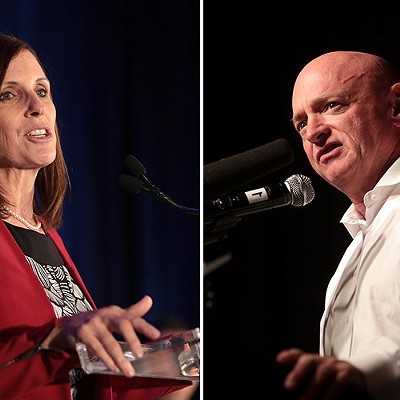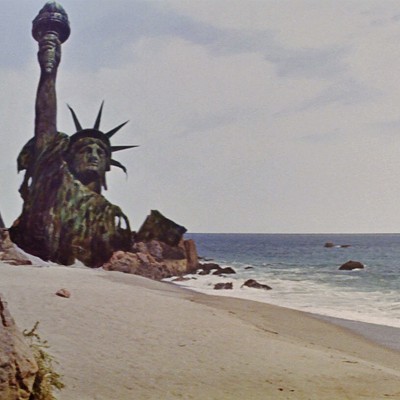For that, we have only the feds to blame. When their fees truly faced a legal test, they blinked. In turn, that bureaucratic body-language sends an interesting if murky message to mountain users.
The message is this: If you don't pay the $5 Mt. Lemmon recreation fee, and later find a ticket on your car, don't sweat it. If you get fined and decide to fight, the U.S. Forest Service will likely back down.
This story starts in 2005, when Tucson legal secretary Christine Wallace was fined twice over as many weeks for not paying the $5 Mount Lemmon recreation fee. She later refused to pay the fines as well, becoming the first American to challenge fees charged on Mt. Lemmon and other so-called High-Impact Recreation Areas or HIRAS across the nation.
Wallace contends that HIRAs aren't legal. "I don't think I am above the law," she told the Weekly in an earlier interview. "But I do think people should not have to pay a fee to park their car and go hiking in the forest."
Indeed, these particular fees are not found anywhere within the Federal Lands Recreation Enhancement Act, which authorizes fees charged by the Forest Service and other agencies.
For the Coronado National Forest, there's plenty at stake. The Santa Catalinas--including Sabino Canyon--bring in between $600,000 and $700,000 each year from fees. Of that, about $100,000 goes to informative and interpretive services, another $300,000 pays for safety and water systems, and $75,000 is spent to enforce compliance.
Still, there are restrictions on the agencies. Specifically, FLREA says that fees can no longer be charged "solely for parking, undesignated parking, or picnicking along roads or trailsides."
But to get around that little hurdle, the Forest Service simply created its own fee policy for the special high-impact areas--a designation with no basis in law. And soon the Coronado deemed the final 28 miles of roadway to Mt. Lemmon--and one half-mile on each side--as a HIRA, and started charging $5 at the little Catalina Highway kiosk.
In light of this, last year a federal magistrate ruled in Wallace's favor. But the Forest Service appealed, and a second judge referred her for trial. After more delays, the case was set for a September jury.
But there were enormous changes at the last moment. In particular, the U.S. Attorney for Arizona--representing the Forest Service--pulled the most contentious charge against Wallace, in which a ticket was simply left on her car. As it happens, that car had been parked beside a locked gate, next to a closed campground.
In the end, Wallace was found guilty on the second charge, arising from when she was ticketed, in person, by a forest service officer. At the time, she was standing near a picnic area.
This is how ridiculous it gets.
And why was the more critical charge--and one more ripe for appeal--ultimately dropped? According to Sandy Raynor, a spokeswoman for the U.S. Attorney's office, that charge was abandoned because no one saw Wallace with her car. "It's about a recreation fee, not a parking fee," Raynor says.
Still, this was a deft if deceptive move on the government's part. Had the judge ruled in Wallace's favor, it might have jeopardized the Forest Service's common practice of leaving tickets on cars. And since Wallace was parked next to a locked and defunct campground, it would have directly tested the HIRA limits.
But instead, the government walked away, the better to preserve its fees for another day.
It's not the first time Mary Ellen Barilotti has seen these legal shenanigans. Barilotti is Wallace's attorney, and she's handled similar cases in California. The Forest Service just keeps applying the HIRA fees policy, she says, "and then when they get challenged on it, they drop it. That's why I thought this case was so disingenuous."
Disingenuous and costly, at least in federal man-hours spent. Critics also question the priorities of the Arizona U.S. Attorney's Office. Recently, the Arizona Daily Star reported that the office was failing to prosecute marijuana smuggling seizures under 500 pounds, due to a lack of prosecutors. But somehow, that same office carried the Wallace case nearly to the bitter end--and ended up winning a $100 fine.
But there's a larger issue at stake. And Coronado Forest Supervisor Jeanine Derby says it isn't about where Wallace was parked, but her whereabouts when the ticket was given. "Most of the time people pay the $5, if they're not trying to make a statement, which I think this person was."
This case won't change procedure, Derby says. "But when we take these to court, we look at actually needing to connect the person with their vehicle."
And despite the government's twilight capitulation, she says tickets will still be placed on cars "if it's apparent they're parked someplace where (the owner) is actually recreating, like right next to a trailhead or right next to a developed site. It takes a certain amount of judgment on the part of (officers) in the field, to decide whether they are there for the purpose of recreation."
To critics like Barilotti, however, the Forest Service is just playing a costly game of bluff. "It's deceitful and a disservice to the public," she says. "They're supposed to be interpreting these things with the public trust in mind, and I don't think they're considering the public trust at all. They're just considering whether or not they're able to continue this policy.
Either way, the government has bluffed with finesse. "We've decided not to appeal the criminal issue," Barilotti says, "because at the 11th hour they dismissed the first citation. That was really the meat of the legal issue we'd appeal on, because Christine wasn't seen in the forest and she wasn't in a developed area--she was locked out of that area because the campground was closed. The legal issues would have been much cleaner if they had gone forward with that.
"Still, it doesn't mean we're out of the ballgame. We're exploring other options. The issue is not a $5 fee. The issue is whether agencies are obligated to follow the law."












